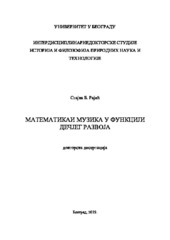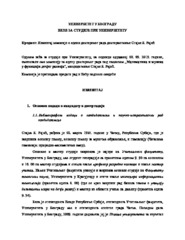Приказ основних података о дисертацији
Математика и музика у функцији дечјег развоја
Mаthematics and music in the function of child development
| dc.contributor.advisor | Manojlović, Vesna | |
| dc.contributor.other | Drobni, Ivana | |
| dc.contributor.other | Marković, Predrag | |
| dc.contributor.other | Tasevska, Alma | |
| dc.contributor.other | Deretić, Irina | |
| dc.creator | Rajić, Stajka | |
| dc.date.accessioned | 2020-07-06T11:29:38Z | |
| dc.date.available | 2020-02-27T11:29:38Z | |
| dc.date.available | 2020-07-03T09:16:46Z | |
| dc.date.issued | 2020-01-21 | |
| dc.identifier.uri | http://eteze.bg.ac.rs/application/showtheses?thesesId=7253 | |
| dc.identifier.uri | https://nardus.mpn.gov.rs/handle/123456789/12142 | |
| dc.identifier.uri | https://fedorabg.bg.ac.rs/fedora/get/o:20998/bdef:Content/download | |
| dc.identifier.uri | http://vbs.rs/scripts/cobiss?command=DISPLAY&base=70036&RID=51880719 | |
| dc.description.abstract | Математика и музика, антипод једна другој, од најстаријих периода људске цивилизације развијале су се кроз природу и у природи. И једна и друга област полазеод практичне потребе човека за премеравањем, пребројавањем, упоређивањем – математика; односно, песмом, ритмом, плесом – музика. Указујући на историјски развој и филозофска становишта, како математике тако и музике, уочава се да су поменуте областипрешле пут од практичних делатности ка апстрактним дисциплинама науке и уметности. На том путу развоја, математика и музика, од самих почетака укрштале су своје теоријске основе и на тај начин међусобно допринеле формирању појединих математичких односно музичких закона и законитости. Ако би се теорија музике и/или дела великих уметникапосматрала оком математике, у њима би се пронашле математичке законитости, које су или биле основ за формирање музичких правила, или су, пак, и математика и музика у свом развоју прихватиле нека заједничка начела и принципе и по њима градиле своје теоријске основе. Кроз историјски развој,филозофска гледишта великих мислилаца, као и кроз указивање на конкретне примере везе математике и музике у раду се указује да су, иако априори неспојиве, математика и музика две дисциплине које се међусобно прожимају и међу којима постоји нераскидива веза. Педагошки део рада који је обухватио и емпиријско истраживање, има за циљ да представи у којој мери примена конкретне математичко-музичке игре доприноси дечјем социјалном, емотивном и когнитивном развоју, те развоју социо-емотивних и когнитивних вештина деце узраста од осам до дванаест година старости. Повезивање математичких и музичких садржаја и њихово обликовање у дидактичку игру1 идеја је водиља методолошког дела рада.Истраживање је спроведено у две интернационалне школе на територији Београда уз примену игреMusical Monkeys, а у сарадњи са тимом MusicMathиз Мексика, који су и креатори поменуте игре. ИграMusical Monkeys, одабрана је због своје интердисциплинарности, педагошке подобности, интерактивности, динамичности и иновативности.Резултати истраживања показали су да овакав приступ у раду са децом подстиче пажњу и мотивацију, активност и ангажовање у настави, захтева и подстиче критичко мишљење при решавању постављених математичких и/или музичких задатака, доприноси сарадњи, колаборацији, конструктивној комуникацији и тимском раду деце, уважавању мишљења других, проналажењу заједничке стратегије решења проблема, те поштовању правила игре, као и ентузијазму, осећању радости и међусобном уживању при реализацији постављених задатака. Добијени резултати потврђују да су деца повезала садржаје две области, математике и музикеи да је за њих, тај моменат био један у низу интересантних у самој игри... јер, питање је,како je заправо могуће повезати математику и музику? | sr |
| dc.description.abstract | Mathematics and music, in a mutual antipodal position, have developed from the earliest periods of human civilisation through and within the nature. Both these areas start from the practical need of man to measure, build, count, compare in the case of mathematics, and song, rhythm and dance, in the case of music. Pointing to the historic development and the philosophical stance of both mathematics and music, it is apparent that these areas have progressed from practical activities to abstract scientific and artistic disciplines. On this development path, mathematics and music have from the very beginning interweaved their theoretical foundations, thereby jointly contributing to formation of individual mathematical and musical laws and rules. If we were to view the theory of music and/or works of great musicians from a mathematical point of view, we would discover mathematical rules as a base for formation of musical patterns, or it could be concluded that both mathematics and music have introduced certain mutual principles in their respective courses of development, using these principles to build their theoretical foundations. Following the course of historical development, philosophical stances of great thinkers, while also pointing to concrete examples of links between mathematics and music, the paper aims to show that although a priori unrelatable, mathematics and music represent two mutually interconnected disciplines, with unbreakable bonds. The pedagogical part of the paper included empirical research, aims to present the extent to which the application of the concrete mathematical and musical play contributes to the child‟s social, emotional and cognitive development, as well as development of the social and emotional and cognitive skills in children aged eight to twelve. By connecting mathematical and musical contents and their shaping in a didactic play2 is the guiding ide of the methodological part of the paper. The research was conducted in two international schools in Belgrade, using the play titled „Musical Monkeys‟ and in collaboration with the MusicMath team from Mexico. The results of the research have shown that this kind of approach in working with children encourages 2 Didactic play – a complex pedagogical activity which enables mastering if certain contents and knowledge, development of capabilities as well as an experience of consequences of own actions in the play (Bognar i Matijević,1993). attention and motivation, activity and engagement, while requiring and encouraging critical thinking in solving the set mathematical and/or musical tasks, contributing to cooperation, collaboration, constructive communication and team work of children, appreciating others‟ opinions, finding a joint strategy in problem solving, as well as respecting the rules of the game, developing enthusiasm, feeling of happiness and joy in working on the set tasks. The obtained results confirm that the children established connection between the mathematical and musical segments, reaching a culmination in a moment of interest within the play, because of the inevitable question – how can mathematics and music be connected? | en |
| dc.format | application/pdf | |
| dc.language | sr | |
| dc.publisher | Универзитет у Београду, Студије при универзитету | sr |
| dc.rights | openAccess | en |
| dc.source | Универзитет у Београду | sr |
| dc.subject | математика | sr |
| dc.subject | mathematics | en |
| dc.subject | music | en |
| dc.subject | history and philosophy of mathematics | en |
| dc.subject | relationship between mathematics and music | en |
| dc.subject | children’s play | en |
| dc.subject | social | en |
| dc.subject | emotional and cognitive development | en |
| dc.subject | музика | sr |
| dc.subject | историја и филозофија математике | sr |
| dc.subject | историја и филозофија музике | sr |
| dc.subject | однос математике и музике | sr |
| dc.subject | дечја игра | sr |
| dc.subject | социјални | sr |
| dc.subject | емотивни и когнитивни развој | sr |
| dc.title | Математика и музика у функцији дечјег развоја | sr |
| dc.title.alternative | Mаthematics and music in the function of child development | en |
| dc.type | doctoralThesis | en |
| dc.rights.license | ARR | |
| dc.identifier.fulltext | https://nardus.mpn.gov.rs/bitstream/id/16730/Disertacija.pdf | |
| dc.identifier.fulltext | http://nardus.mpn.gov.rs/bitstream/id/16731/IzvestajKomisije22176.pdf | |
| dc.identifier.fulltext | https://nardus.mpn.gov.rs/bitstream/id/16731/IzvestajKomisije22176.pdf | |
| dc.identifier.fulltext | http://nardus.mpn.gov.rs/bitstream/id/16730/Disertacija.pdf | |
| dc.identifier.rcub | https://hdl.handle.net/21.15107/rcub_nardus_12142 |



